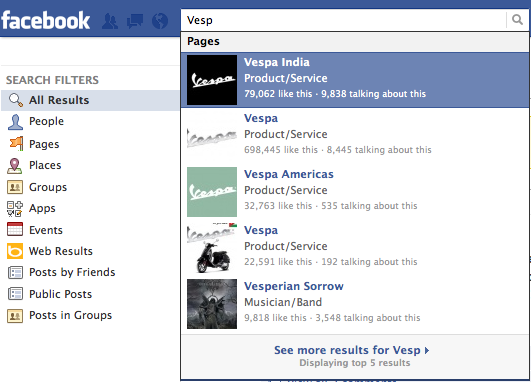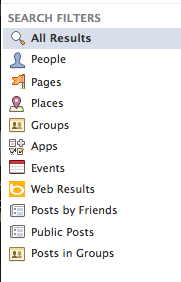Facebook Search Optimization: Two Levels
Google is still the king of Search; this hasn’t changed and won’t be changing anytime soon. YouTube is number two but when it comes to Facebook users are becoming more and more accustomed to using their search bar to find out information. I can remember doing a search on Facebook 10 minutes after Sidney Crosby scored the game winner to see if there was a group of people somewhere talking about it. I was right and I joined the group to take part in the conversation.
While we are all very familiar with Googles Search and how you can optimize your website effective for Google Rankings – Facebook is a bit more complicating. Unlike Googles Algorithm which is a mathematical mess – Facebook has two levels and the way those levels interact with users differ from one individual to the next.
Facebook SEO: AutoComplete or AutoSuggest

It all begins with the first level, which is referred to as Auto-Complete, or Facebook Auto-Suggest. Basically, this is very similar to auto-correct on your iPhone or the guessing game that Google plays when you try to do a search. If you don’t see what you’re looking for in Facebooks Autosuggest you can click to “See more results for…” to get to “Advanced Facebook” search results that include Pages, Friends, Applications and even web results.
Facebook SEO: Filtering Search Results

Once you have gotten this far, its time to start filtering your results by type, for example if you only want to see pages – You can do that. This is the second layer of search after a user types in a page title in the search bar. This is where users are able to get more advanced with their search and thus limit your ability to manipulate your ranking.
If a user only wants to see profiles of people, that’s what they will see if they select the profile icon. The default will show a mix of profiles, pages and groups depending on the topic but the search allows for filtering to get very specific. At this stage, it’s truly all about the popularity of the page and how many “friends” of a specific friend has who have liked it. Facebook believes that people who are friends are like-minded and thus, they will show pages your friends like higher up the rankings.
How do I improve my search ranking for a Facebook Page?
What’s Your Page Name?
I’ve seen a lot of brand pages filled with key words and fluff over the last few years and it drives me insane. Jamming your page title with keywords is stupid. Don’t do it. What you need to do is have a page name that will resonate with consumers and one that you know they are likely to search for when looking for your brand. If your business is “Sticky Chocolate Bars” – You’re not going to have a page name called “The Amazing Sticky Chocolate Candies Shop” – Call it “Sticky Chocolate Bars”. The title of your page matters but the pages popularity matters even more. Thus, it’s important to keep your title simple, easy to remember and obvious.
Facebook Page Name: The name of your Facebook Page is also going to be used as the pages Title Tags (this is the linked part that shows up in both Google and Facebook search) for all search. Every time someone likes your page on Facebook, that title tag gets associated with his or her profile – Make sure it’s right and try to keep it under 30 characters.
Facebook Exact Search: Facebook loves the exact search. They are obsessed with providing people with exactly what they want when they want it. As such, when you create a page name it will only show up in people’s feeds when they search exactly what your title is called.
Does Your Page have a Vanity URL?
I’m shocked how many pages still have a bunch of random numbers in their URL. It’s very easy to change your Facebook URL from Facebook.com/pages/3983427 to Facebook.com/StickyChocolate. When you create a short and easy to read URL, it makes it more appealing for both advertising and search engines. The admin of your page can set a custom URL by visiting the Username section on Facebook. The page does have the requirement of having at least 25 likes and can only be changed if you contact Facebook directly.
Did You Fill out Your Page Info?
This is an easy and obvious tactic but one that is often overlooked. You should fill out the information on the “About Us” box and a detailed description on the “Info” tab to describe what your business or organizations all about. All of this content is able to be indexed by Google and will boost your rankings if you describe your business in a smart, keyword rich but legible way. Be sure to include back links to any relevant websites that are associated with your page as well.
BONUS: USE THE NOTES SECTION
The notes section isn’t that sexy but it sure is effective. If you write a note on Facebook and make sure it’s relevant to your business it will have a great chance of showing up on Google Searches about the notes specific topic. You don’t want to use notes for every little thing you do with your business but using notes to showcase key items could be a great approach. For example, if you’re trying to use social media for your coffee shop – you may way to use the notes section to list your menu and prices.
Everyone searches for menus before they go to a place for supper so that tip is a homerun. In fact, all of these tactics are homeruns for getting better at Facebook Search! So what are you waiting for? Get up to bat and start swinging!
If there is anything you think I missed – I’d love to hear from you in the comments. I’m really hoping to make this the only guide you need. Thus, if there is anything missing or that you want more information on let me know and I’ll add it in!
